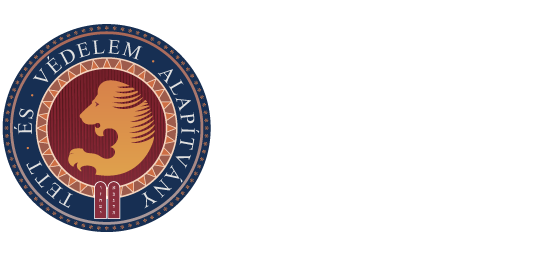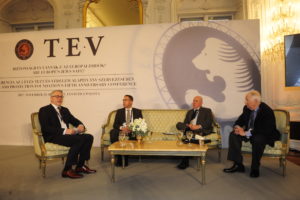Are Europe’s Jews safe?
Action and Protection Foundation held an international conference in Budapest to mark the 5th anniversary of its activities. The nature, impact and potential risks of mass migration to Europe, the methodological issues of measuring anti-Semitism, and the responsiveness of young people to anti-Semitism and extremism were among the topics discussed by prominent Hungarian and international experts during the conference. Minister of State at the Ministry of Foreign Affairs and Trade Dr. István Mikola and Deputy State Secretary of the Prime Minister’s Office Dr. Csaba Latorcai also attended the event.
In his opening speech, Secretary of Action and Protection Foundation Kálmán Szalai highlighted that Executive Rabbi Slomó Köves initiated the establishment of the foundation five years ago with the aims of actively engaging in the protection of Jewish compatriots who become victims of identity harm, as well as monitoring and taking action against hate incidents.
Executive Rabbi of the Unified Hungarian Jewish Congregation (EMIH) Slomó Köves said in his keynote speech that Jewish communities had long been locked into a negative mindset believing that the natural inclination to self-defense did not apply to Jewish people. Many thought that this was the business of “the great”: they will be protected by the state, by political parties, human rights activists, civil society organizations, or the great powers. Rabbi Köves also expressed his regret that they were often left alone when they needed help the most. Therefore, in his opinion, the Jewish community shall start taking responsibility for their own safety.
Slomó Köves explained: “Our activities are based on three pillars: responsibility, co-operation and action. Under taking responsibility, I mean that it is harmful if we wait for others to help us when action needs to be taken against anti-Semitism. Therefore, APF takes a number of steps in line with this idea: we monitor anti-Semitic hate incidents on a monthly basis, we conduct research on anti-Semitic attitudes every year in accordance with OSCE international standards, and in the last five years, we launched 87 legal proceedings in Hungary and the US and initiated 4 legislative amendments that were approved. We have also cooperated with both Hungarian and international organizations. There’s a Talmudic saying that says: ‘If I am not for myself, who will be for me? If I am only for myself, what am I? And if not now, when?’. Not only does this saying refer to our faith in the Lord and his help, but also to the fact that we need to be aware of our responsibilities, we should start taking action and ask help from others who take the problems of Jewish communities seriously and who could become partners in our mission. We should not be self-important or distrusting. If we look for co-operation, we will find it, just as APF has found it – whether we are talking about international organizations like the Anti-Defamation League led by Andrew Srulevitch, the American Jewish Committee, or the London-based unit for Government and International Affairs of the Community Security Trust directed by Michael Whine. Still on cooperation, we could mention András Kovács, Dániel Róna and Endre Hann with whom we have been conducting research, as well as the positive attitude that the Ministry of Interior and the Prime Minister’s Office have towards us. We have also worked together with various entities in the field of education, we have offered lectures at the National University of Public Service, but it may be even more important that we have been raising awareness of the dangers of anti-Semitism by teaching the younger generation in secondary schools.”
The third pillar Rabbi Köves talked about was taking action. He said that the challenges of our time, the growth of Islamic fundamentalism – which is becoming a more and more serious issue in Europe due to the migration crisis –, require actions. According to Slomó Köves, the anti-Israelism and anti-Semitism of far-right organizations, usually concealed in movements of consumer protection and boycotts, should also be responded. One of the most significant of such movements is the American BDS movement, he mentioned. Slomó Köves said it is Jobbik’s far-right ideology that poses the main problem in Hungary, against which Action and Protection Foundation and its partners will continue to fight.
Director of International Jewish Affairs of the American Jewish Committee and Personal Representative on Combating Anti-Semitism of the Chairperson-in-Office of the Organization for Security and Cooperation in Europe (OSCE) Rabbi Andrew Baker said that only after the communism could the countries in Eastern and Central Europe be engaged in an active politics of memory in relation to the Jewish community and the Holocaust. In that respect, Hungary is taking the lead in the field of education and in establishing museums, memorial sites and Jewish cultural centers. On the other hand, there seems to be a recent slowdown in this process – said Rabbi baker.
On behalf of the Ministry of Foreign Affairs and Trade, State Secretary Dr. István Mikola said that Hungary remained a safe place even amid the migration crisis and it provides a secure home for the Jewish community, and this is not going to change in the future. Deputy State Secretary for Priority Social Affairs of the Prime Minister’s Office Dr. Csaba Latorcai said that Europe today is rich, but weak and the problem is that it does not realize its weakness and is not able to counter it. Instead of strengthening their identities based on Jewish and Christian values, a number of European countries are about to throw away those values that have provided their resistance for centuries. In the meantime, anti-Semitism is growing and the situation is particularly bad in the US and in some of the big cities in Western Europe – said the Deputy State Secretary.
The first panel of the conference dealt with the nature, the drivers and risk analysis of mass migration to Europe. The speakers and experts coming from different fields examined how the terror threat accompanying the phenomenon could be identified and countered, and how the growing anti-Semitism resulting from Islamic fundamentalist movements could be marginalized. Speakers of the first panel, including chairman of APF Dániel Bodnár agreed that although Jewish communities do not face direct, physical threat in Hungary, anti-Semitic ideologies are still present in public life.
In the second panel, researchers Melissa Sonnino, András Kovács, Dániel Róna and Endre Hann discussed different methodologies of measuring anti-Semitism. The speakers tried to give answers to what statements and actions are categorized as anti-Semitism and how anti-Semitism could be examined and measured. According to one of the most interesting findings, approximately 10% of the Hungarian population was particularly responsive to anti-Semitic ideologies after the change of the regime, then in 2010 – mainly due to the fact that members of Jobbik entered the National Assembly and, as a result, the party’s ideologies became more mainstream – this proportion suddenly rose to 20%.
The third part of the conference dealt with the correlation between education and prejudice. Speakers stated that education and raising awareness among members of the young generation who are uncertain about their worldviews and sets of values and are responsive to radical views are of key importance in the fight against anti-Semitism. Speakers of the third panel talked about anti-Semitism disguised as anti-Israelism and one of its most significant manifestations, the BDS movement. It was stated that the movement does not have a significant number of supporters in Hungary and that there are more and more appropriate actions taken against the movement at universities in Western Europe, too. Director of Public Affairs and Communications at The Jewish Agency Yigal Palmor drew attention to the irrationality behind anti-Israelism when he said that members of the BDS movement attack a country that have posed them no harm. Alex Benjamin claimed in his speech that these days the UN treats Israel as a bastard child while Assistant Director of ADL Andrew Srulevitch talked about that the number of anti-Semitic incidents have grown in the US, too, especially in university environments.
The whole conference is available on the following links:




